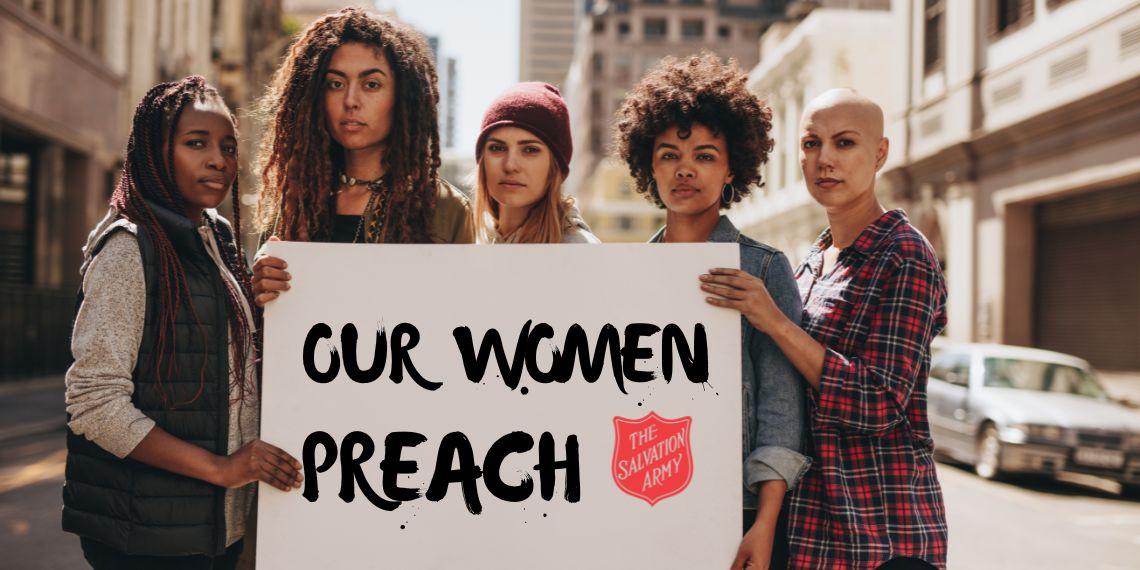Women in Leadership: Is The Salvation Army Settling for Less?

By Major Christina Tyson
The Salvation Army believes both men and women are called to serve at all levels of the church and that leadership should be based primarily on gifting, not gender. William and Catherine Booth held radical egalitarian views for their time, with Catherine a strong influence in shaping these views. Catherine’s argument for women’s equality had three simple points, writes John Read in his book Catherine Booth:
- Women were originally created equal with men.
- Their subjection was part of the curse.
- In Christ, the equality of women has been restored.
Even today, the foundations laid out in 1895 feel aspirational and prophetic:
‘One of the leading principles upon which the Army is based is the right of women to an equal share with men in the work of publishing salvation to the world … Let it therefore be understood that women are eligible for the highest commands—indeed, no woman is to be kept back from any position of power or influence merely on account of her sex,’ says the 1895 Orders and Regulations for Staff Officers of The Salvation Army:
Are we walking our historical talk?
In Janet Munn’s seminal study on Theory and Practice of Gender Equality in The Salvation Army (Gracednotes Ministries, 2015), she reported The Salvation Army had more females in leadership than any other church, denomination or Christian organisation.
As an international organisation serving in countries where females are kept from educational and employment opportunities and can be exposed to situations of abuse simply because they are considered of less worth than males, our strong proportion of female leadership is something to be proud of. In many countries, The Salvation Army is an oasis where females who might otherwise be marginalised come to realise their God-given potential and right to partner equally with men in all aspects of church life and mission—including as leaders. In such environments, Salvationist women are role models and change makers.
However, digging deeper into those same statistics, Munn uncovered cause for concern. Despite the large number of female officers, there was not equality of appointment at senior level. In 2011, of the 518 officer appointments ‘involving the highest responsibility’, only 47 (9.07%) were female. These numbers were largely the same in 2016.
Of course, Munn is focusing on positional leadership in her analysis—which is not the whole story. The issue of females in leadership is, thankfully, far broader and deeper than these few ‘highest responsibility’ appointments. In an organisation founded by Jesus, who turned positional leadership on its head with his strong depiction of servant leadership, we naturally adopt a view of leadership beyond positional leadership to one that encompasses leadership influence. All Salvation Army female officers, like our male colleagues, are released as influencing leaders. In addition, we have many valuable women contributing as soldiers, staff and volunteers – who are equally rich in leadership potential.
There has also been progress in gender equity. The focus of the Accountability Movement includes a focus on greater development of leadership skills in women and men. I’m optimistic that the Accountability Movement will help position us better for the future.
"The Salvation Army espouses an equality of purpose for men and women — but there also needs to be equality of opportunity. And it is the latter that is the biggest obstacle to releasing more females into the leadership of The Salvation Army today."
Our territory recently had a married female Chief Secretary in Colonel Suzanne Fincham, and last year we launched the Gender Equity Committee. Australia has appointed a National Gender Equity Advocate. There are discussions being held at IHQ and in this territory about leaving behind the idea of ‘default appointments’ (traditionally given to married women officers when their husbands receive a more senior leadership role). At the same time, we are grateful that do many non-officer women exercise their considerable leadership skills to strengthen the Army’s mission in headquarters, corps and centres. There are real signs of progress. However, there is still a road to travel.
General Brian Peddle has said that ‘gender equity is an issue we can’t celebrate to the level we want to celebrate it. … The reality is that we have leaders at present who were not afforded that opportunity. What we are dealing with is the consequences of that inequity.’
In the meantime, we need to recognise that the gap between the bold vision in 1895 of gender equality in ‘the highest commands’ and today’s present-day reality. This cannot be explained away by pointing out that females have many wonderful leadership opportunities within Women’s Ministries, or that female officers are routinely exercising leadership in joint roles alongside their husbands, or that female staff may prefer to operate more in mid-level roles, or that upskilling is on the way to enable more females to step into more senior/governance roles. All of these things are undoubtedly true, but it is also true that when it comes to mobilising our female force, we have not yet delivered on our pioneering vision.
Let us never forget that on the day of Pentecost, the Spirit was poured out on men and women. The work of the Spirit is always a work of equality!
Narrowing the gap
In her 2016 lecture on ‘Breaking the Stained Glass Ceiling’, Rev. Jo Kelly-Moore commented that once female representation reached around 30 per cent, this seemed to be regarded as ‘equal’ across society, with people thinking, ‘We’ve done it now; everything is okay.’
Such thinking was also evident in church circles. Kelly-Moore offered some helpful questions to reveal the obstacles that keep females from senior positions:
- Is female leadership trusted as much as male leadership in the church?
- Do we see females as ‘aggressive’ when they put themselves forward for a role, rather than simply ‘confident’ (as a male would typically be described)?
- Is there structural space for female voices to be heard and for their gifts to help shape the organisation?
Over its history, The Salvation Army has given many women the opportunity to serve God. But we must also recognise we have not yet delivered on the bold view of gender equality advocated by pioneer Salvationists. Is it possible the same obstacles identified by Kelly-Moore also hold the Army back from mobilising more women, particularly in senior leadership?
Gender neutral
Ideally, The Salvation Army could operate in a ‘gender neutral’ fashion, where leaders are based on passion, skills and suitability—not gender. This would be a fair and wise approach where we endeavour to be good stewards of the people-assets God has placed at the Army’s disposal. However, we are still a long way from operating in such a fashion, and so there is still a need at this time for an affirmative-action approach, with a corrective bias in the way we develop and appoint women.
Kelly-Moore identifies four things to address if we are serious about gender equality:
- Intentional choices on the part of the organisation.
- Increased training opportunities for women.
- Conscious awareness on the part of the church.
- Male allies prepared to support an advancement of leadership opportunities, and thereby a normalising of women in leadership.
As officers, my husband and I have been in separate appointments for the past 16 years of our 26 years as officers. This has been made possible because of the intentional choices and training opportunities of my leaders, but also because I have a husband who is one of those male allies—a cheerleader, rather than a competitor. And women leaders in The Salvation Army do need cheerleaders! It’s been my experience, for instance, that females can be criticised as ‘pushy, opinionated and arrogant’, where a male might be judged as ‘focused, strong and assertive’. How many women in our Army are labelled ‘difficult’, when they may simply possess leadership gifts that do not fit the more ‘feminine’ perception of how women are ‘meant’ to lead? And so they are sidelined or even ‘managed out’, rather than supported to find a place from which they can strengthen the Army’s mission.
If we have had the door of equality in leadership opened for us, we must be proactive about keeping that door open for others. With that encouragement in mind, here are a few of my own suggestions of how we might more intentionally increase gender parity within The Salvation Army:
- Acknowledge there are seasons when it is appropriate for females to take a ‘lesser’ leadership role, such as when children are young. But recognise that a ‘return-to-work’ development plan may be necessary to bridge any knowledge/skill gap that may have resulted from this season.
- Consider options such as Salvation Army-funded childcare (if parents’ of young children choose this) to prevent a later knowledge/skills gap.
- Encourage married officer couples to pursue their individual areas of passion and gifting, recognising that individual appointments rather than joint appointments may be required and that they therefore need to be equipped for that eventuality.
- View separate officer appointments as a development pathway that will ready some females to one day move into more senior appointments, including governance roles.
- Promote the expectation that all personnel - male and female, officers and non-officers - will speak up and let their managers know where they might see themselves serving and how they would like to be developed.
Keep telling the story
Kelly-Moore observes that today’s women are generations removed from the experiences of the early women’s rights campaigners. We do not have a direct connection to their experiences and so have perhaps become complacent and even apathetic about what those struggles delivered. As women, we may even have become complicit in the marginalising of female leaders, settling for less than God’s divine imperative. Have we been lulled into believing ‘everything is okay’ when a significant cultural shift is still long overdue?
The Salvation Army espouses an equality of purpose for men and women — but there also needs to be equality of opportunity. And it is the latter that is the biggest obstacle to releasing more females into the leadership of The Salvation Army today. In challenging the prevailing male norm, we could ask how individuals are appointed to senior roles? When it comes to officer couples, we might ask which individual is best suited to the more senior role?
To make change, we must ‘keep the story that we have inherited alive’, says Kelly-Moore. She is, of course, thinking of the story of the equal rights that women justly deserve across society, but in The Salvation Army we need to also keep alive our story of equal rights for women leaders. None of us fought this battle ourselves, but we are its recipients. If we agree there is a gap between The Salvation Army’s practice and our professed beliefs in the area of gender equality, it is not enough to blame others or to complain that this situation is not what Catherine Booth or other pioneers would have wanted. It is our duty—female leaders and our male allies—to take up the unfinished story we have inherited and craft the next chapter.
WHAT DO YOU THINK? …
Is The Salvation Army walking the talk of gender equality?
Have we become complacent and accepting of today’s norm, which is still a largely male one?
Does our practice still match our beliefs?
Where do you see the largest discrepancies? What could be done to address these?
And, whether you are female or male, what will YOU do in your own ministry and leadership to make change?
Do you have questions or feedback on gender equity? Please contact Colonel Julie Campbell, chair of the Gender Equity Committee: Julie.Campbell@salvationarmy.org.nz
